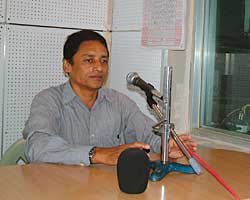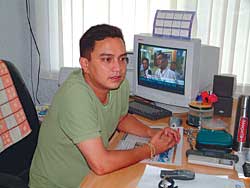Early morning in Pokhara. Through the monsoon drizzle, a procession of slightly stocky men in tracksuits walks briskly along the lakeside on their morning constitutionals. On one hand they have umbrellas, in the other radios. Earphones are stuck into their ears. No, they are not listening to music on the discman, they are catching up with the main news headlines of that morning's Kathmandu papers.
If you have been wondering how it is that Pokhara citizens are suddenly so well informed, the reason is clear: it is the arrival of four new FM channels in Pokhara in the past year with a wide variety of programming from news and current affairs, folk song competitions, phone-ins and radio chats.
"We have found that the morning news has the highest ratings, and this is closely followed by folk songs" says Dev Chhetri, managing director, of Radio Machapuchre, named after the stunningly beautiful mountain that dominates Pokhara.
The people of Pokhara are traditionally renowned for their love of folk music, and many of the most popular Nepali folk songs have been composed and sung by Pokhara's talented musicians. One of them is Saroj Gopal Bajracharya, who wrote the famous songs Bijaypur khola tarera and Nakkali lai bhagai lagyo, which were big hits in the 1970s.
Pokhara-native Shrestha is now station manager of Radio Machapuchre, and he is happy that FM has given folk songs a big boost with popular programmes like "Hello 91", "Old is Gold" and "Your Choice". "This is a great example of new technology supporting culture and tradition rather than destroying it," Shrestha says proudly.
Sushil Lama, managing director of Annapurna FM is equally enthusiastic. "We have tried to stress the quality of music and current affairs, and the response has been overwhelming," he told us. "The challenge now is to make the stations break-even." That could happen soon, since national-level advertisers are also drawn by the high purchasing power of listeners to Pokhara's FM stations.
Besides Machapuchre FM 91 , three stations have gone on air: Annapurna FM 93.4, Himchuli FM 92.2, Pokhara FM 95.8. Between them, the stations cover the Pokhara valley, and can even be heard as far away as Bandipur, the hills of Palpa, Baglung, Syangja and Parbat districts.
As a business, the advertising pie does not seem to be large enough to sustain four stations. There is bound to be a shakeout soon, with Machapuchre and Annapurna battling it out for the top slot. Both have lucrative cable television businesses to sustain losses for the present. "There is enough business here for us to do well and recoup our investment," says Dev Chhetri.
There are now numerous digital studios in the town recording new songs by Pokhara's budding crooners who are mixing folk with pop. The big difference with Kathmandu is that FM has given Pokhara artists a tremendous burst of creativity and new songs are hitting the airwaves every week. "There may be a thing or two that Pokhara can teach Kathmandu," says Sushil Lama of Annapurna FM.
Feedback from listeners throughout central Nepal has been phenomenal. Bajracharya points to the sack of letters on the table at the reception desk at Radio Machapuchre, and says they are all two days worth of letters from listeners. Most are requests for songs or sending in poetry for broadcast and feedback and suggestions on programming.
Now that the Surpeme Court has ruled that non-government FM stations can broadcast news, the stations provide breaking news and updates. When events like the Maoist attack in Argakhanchi happen producers interrupt their regular programming with reporters calling in from Palpa and other points with fresh updates. Besides relaying the morning news headlines, the stations go regularly to Kathmandu for fresh political perspectives from the capital.
Himchuli FM has a tie-up with Radio Sagarmatha in Kathmandu and other stations hook up with private production centres for news updates. The only loser in all this seems to be the venerable state-run Radio Nepal, which has suffered a massive exodus of listeners from its medium wave broadcasts. Radio Nepal is now confined largely to its AM listeners in areas which are beyond FM reception.

From famous folk singer to station manager, Saroj Gopal Bajracharya (left) in the studio.

Dev Chhetri of Radio Machapuchre in a morning news meeting.


